
 Greg Macvean
Greg Macvean
Sting, pictured performing in Leith in 2017, believes that the North East has been let down by governments over the years
Sting is in a reflective mood. The Grammy-Award-winning singer-songwriter grew up in Wallsend, Newcastle-upon-Tyne and tells me he is "very proud" of his Tyneside roots.
But the musician is less complimentary about the way the North East of England has been, as he puts it, "wilfully neglected by successive governments for decades".
As he announces a significant donation to an arts institution in Gateshead, he also told the BBC: "The statistics for child poverty in the area are discouraging".
It's clear from our communication that Sting wants to give back to the place and the culture that made him.
The former Police frontman is donating an undisclosed amount to the Baltic Centre for Contemporary Art, sometimes described as the Tate Modern of the North East of England.
It's nearly 50 years since The Police released their debut album featuring tracks such as Roxanne and Can't Stand Losing You.
Those decades have brought him everything a boy who dreamed of musical success could have wished for; he's sold more than 100 million albums worldwide, as The Police frontman and bassist, and later as a solo artist.

![Getty Images [L-R] Stewart Copeland in black top, Andy Summers (in black top) and Sting (in white top and dark scarf) -- holding a glass and smiling, at the A&M offices after signing their record deal in 1978](https://ichef.bbci.co.uk/news/480/cpsprodpb/3674/live/a1d36a20-45f0-11f0-bace-e1270fc31f5e.jpg.webp) Getty Images
Getty Images
[L-R] Stewart Copeland, Andy Summers and Sting pictured after signing their record deal in 1978
In 2022, he also made a reported $300m (£222m), selling his back catalogue to Universal Music Group.
The years haven't been as kind to the region where he was raised and where a third of babies, children and young people grow up in poverty, according to recent data from the End Child Poverty Coalition.
When Sting was born Gordon Sumner in 1951, the son of a milkman and a hairdresser, the North East still had a proud tradition of shipbuilding. He's previously said that his earliest memory was "a massive ship at the end of my street, towering over the houses and blotting out the sun".
But after the decline of that industry, Sting - the yellow and black sweater he wore while performing in a jazz band as a teenager earned him the nickname and it stuck - tells me, despite "all the empty promises of 'levelling up'", for years governments have disregarded the North East, "ignoring its significant historical contribution to national life, both industrial and cultural".
In response to Sting's criticisms, a government spokesman said it would "fix the crisis we have inherited".
It's investing £140m in the seven most deprived towns in the North East, including Washington and Jarrow, as part of a wider £1.5bn investment across the country and told the BBC it is "taking decisive action to tackle the scourge of child poverty".

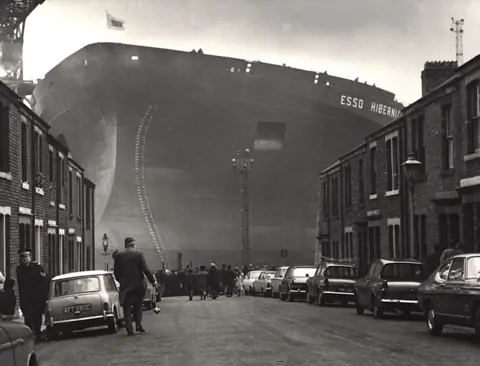 Newcastle City Council
Newcastle City Council
The supertanker, Esso Hibernia was built by Swan Hunter at Wallsend on Tyneside in 1970, and was part of the North East's shipbuilding heartland
He remembers a childhood rich in culture, despite his humble beginnings. "We didn't have any books in the house", he tells me by email, but "I was fortunate in the 60s to have had access to Wallsend library".
He also recalls access to drama at the People's Theatre in Jesmond, one of the oldest non-professional theatre companies in the UK, visits to the Laing Art Gallery and also making his professional debut as a musician in the orchestra pit at The University Theatre.
"All of these institutions gave me a sense of the world beyond the shipyard where I was raised."
The River Tyne's most famous shipyard, Swan Hunter in Wallsend, shut in 1993. Sting describes the now disappeared shipyard to me as "a real and symbolic victim of Government neglect if not betrayal".
He tells me "I had to leave the area to 'make it'" - he moved to London in 1977 and soon after formed The Police with guitarist Andy Summers and drummer Stewart Copeland - but his ties to the North East still apparently run deep.

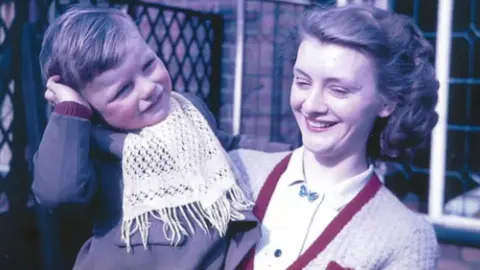 Sting Archive
Sting Archive
Sting, pictured as a boy with his aunt Marion Frater, says his childhood was rich in culture, despite his humble beginnings
As a young Wallsend local, he tells me his love of music was fostered when he saw the virtuoso Spanish classical guitarist Andrés Segovia perform with the chamber orchestra that was then still called the Northern Sinfonia, at Newcastle's City Hall aged 14.
A year later, in 1967, his mind was blown when Jimi Hendrix played the legendary (and long-gone) gig venue Club a'Gogo.
The American guitar prodigy had been brought to the UK by the Newcastle-born bass player of The Animals, Chas Chandler.
Fifteen-year old grammar school boy Sumner couldn't believe what he was seeing, later describing how he "lay in my bed that night with my ears ringing and my world view significantly altered".
In 2023, North Tyneside Council honoured the cultural impact of his work and his connection to the region, granting him the Freedom of the Borough.

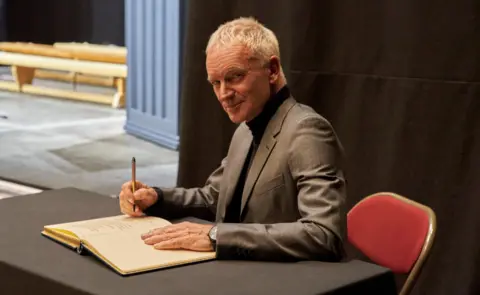 North Tyneside Council
North Tyneside Council
Sting accepted Freedom of Borough from North Tyneside Council in 2023
At 73, he appears to be thinking deeply about the importance of cultural experiences for children growing up in the North East now.
He says he has a debt to the region that he needs to pay back, telling me that art involves "the nourishing of creative sparks that can lie dormant in even the poorest households if not encouraged by exposure to human potential".
Which brings him to the Baltic, which, like museums and art institutions across the UK, is facing challenging financial times in an era of diminishing public investment.
It opened in 2002 in a converted flour mill, a key part of the regeneration of the Gateshead quayside on the south bank of the River Tyne. The Baltic showcases some of the world's best contemporary art - Anish Kapoor and Antony Gormley were amongst the first to exhibit there - and also takes an innovative approach to enticing people into the artspace.

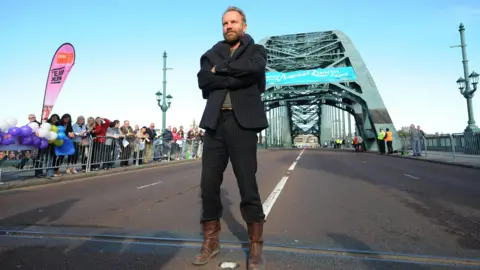 PA
PA
Sting standing on the Tyne Bridge before starting the Great North Run in Newcastle in 2009
There's a café called The Front Room, with free tea, coffee and biscuits sponsored by a local company and breakfast clubs for hungry children in the school holidays. Sewing circles, book clubs, parent toddler groups and others use the space free of charge.
In the past, local pit villages and council estates have been leafleted to advertise the Baltic as a centre for everyone. More than 300,000 children and young people take part in Baltic activities and programmes every year.
Sting's donation kickstarts its plans to fundraise for a £10m Endowment Fund of private investment to safeguard free entry to the centre and ensure its community work can thrive into the future.
"The creative arts are of vital importance to the wellbeing of the community as a whole," he tells me and the Baltic "should be a beacon of hope for regeneration".

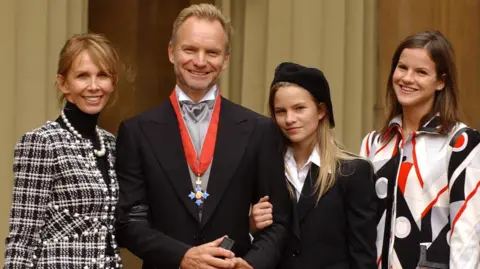 PA
PA
Sting (seen with his wife Trudie Styler, and daughters Coco and Kate at Buckingham Palace) was awarded a CBE for services to the music industry in 2003
He's currently on a world tour with his trio Sting 3.0. Amongst a packed schedule across the US, Asia and Europe, with summer dates in the UK including headlining at the Isle of Wight Festival and Latitude, he'll be heading to Tyneside for one night in October for a gala performance at the Baltic to help raise more funds, with tickets at £10,000 a table.
He's been musing on his roots for some time. His concept album turned musical, The Last Ship, was inspired by the Tyneside shipyards of his childhood.

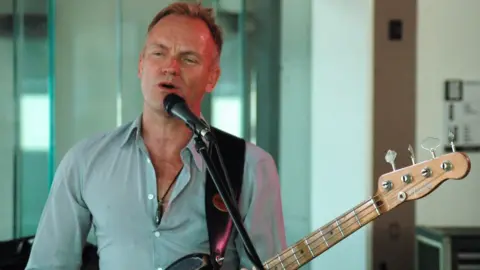 Dave Dunn
Dave Dunn
Sting performed at the Baltic Arts Centre in May 2006 as he received an honorary doctorate in music from Newcastle University
It wasn't entirely well-received critically - or at the box office - when it premiered in the US in 2014. But it's since toured the UK, including to Newcastle, and Sting will perform in it again early next year in Paris.
He wants to sing more widely about the innovative spirit he sees in the North East, telling me: "Geordies are not strangers to innovation, the steam turbine and the locomotive were developed on Tyneside. Britain's success was largely built on these inventions."

 3 months ago
59
3 months ago
59

















































